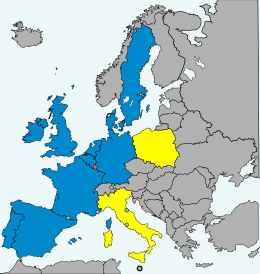Fisheries Convention
| London Fisheries Convention | |
|---|---|
 Parties (coastline involved)
Parties (coastline not involved)
Signatories | |
| Signed | 9 March 1964[1] |
| Location | London, United Kingdom[1] |
| Effective | 15 March 1966[1] |
| Condition | 8 ratifications |
| Signatories | 12[1] |
| Parties | 12[1] |
| Depositary | Government of the United Kingdom of Great Britain and Northern Ireland[2] |
| Languages | English and French |
The Fisheries Convention or the London Fisheries Convention is an international agreement signed in London in relation to fishing rights across the coastal waters of Western Europe, in particular the fishing rights in the North Sea, in the Skagerrak, in the Kattegat and on the European Atlantic coast. It gives right of full access to the fishing grounds between 6 and 12 nautical miles of the national coastline to the fishing industry of those contracting parties that had already been fishing there in the period 1953–1962.
This agreement is largely superseded to the Common Fisheries Policy (the CFP), as all parties are members of the European Union.
Background and negotiations
Between Belgium, Denmark, France, Germany, Netherlands, United Kingdom the "International Convention for regulating the police of the North Sea fisheries outside territorial waters" (the North Sea Fisheries Convention) of 1888 applied which allowed fishing in each other's waters up to 3 miles from the coast line. The United Kingdom denounced this convention in 1963 in order to allow setting up a 12-mile exclusive fishery zone. After denunciation it invited the parties to that convention and several others to negotiate on several issues related to fisheries, which resulted in the Fisheries Convention.[3]
Negotiations took place between the parties of the European Economic Communities, the European Free Trade Association, the Commission of the EEC, as well as Iceland, Ireland and Norway.[3]
Parties
The convention has 12 parties,[1] while 1 signatory (Luxembourg) signed but did not ratify. Poland is a non-signatory which acceded to the convention after its entry into force.
The UK denounced the convention on 3 July 2017,[1][4] effective 2 years later or (if that is on a later date) upon Brexit.[2][5]
| Party | Ratification/ Accession | Entry into force | Superseded | Denunciation/ Withdrawal | Territorial scope |
|---|---|---|---|---|---|
| 10 February 1966 | 15 March 1966 | 21 September 1970 25 January 1983 | all coasts | ||
| 9 October 1964 | 15 March 1966 | 1 January 1973 25 January 1983 | 1 January 1983 (Faroe Islands 1 January 1985 (Greenland) | coasts in the North Sea, in the Skagerrak and in the Kattegat | |
| 5 July 1965 | 15 March 1966 | 21 September 1970 25 January 1983 | The North Sea, the English Channel and the European Atlantic coasts | ||
(originally as West Germany, including Land Berlin) | 19 January 1970 | 19 January 1970 | 21 September 1970 25 January 1983 | The North sea coast | |
| 20 September 1965 | 15 March 1966 | 1 January 1973 25 January 1983 | all coasts | ||
| 25 March 1966 | 25 March 1966 | 21 September 1970 25 January 1983 | |||
| not ratified | 21 September 1970 25 January 1983 | ||||
| 20 July 1971 | 20 July 1971 | 21 September 1970 25 January 1983 | The North Sea coast | ||
| 7 June 1966 | 7 June 1966 | 21 September 1970 1 January 1973 25 January 1983 1 January 1986 1 January 1995 1 May 2004 | |||
| 15 September 1965 | 15 March 1966 | 21 September 1970 1 January 1973 25 January 1983 1 January 1986 | coasts north of the 36th parallel and the coasts of Madeira | ||
| 10 February 1966 | 15 March 1966 | 21 September 1970 1 January 1973 25 January 1983 1 January 1986 | coasts north of the 36th parallel | ||
| 16 February 1966 | 15 March 1966 | 25 January 1983 1 January 1995 | west coast, north of a line drawn from The Kullen (sv) to Gilbjerg Head (sv) | ||
| 11 September 1964 | 15 March 1966 | 1 January 1973 25 January 1983 | 3 July 2017,[5] effective 2019 or upon Brexit[5] | All coasts, including those of the |
Denunciation and withdrawal
The convention can be denounced from 20 years of its entry into force after a two years' notice.[6][2] On 2 July 2017 the United Kingdom announced that the Government would give formal notice on the next day (3 July 2017) to denounce and withdraw from, which it did on 3 July 2017[1] effective 2 years later or upon Brexit.[7] which might have an effect on non-British fishing fleet that have used part of the 6–12 nautical-mile-zone of the UK (and also of the Isle Man and the Channel Islands) under the convention.[8]
See also
References
- 1 2 3 4 5 6 7 8 "Fisheries Convention". Treaty Database of the Government of the Netherlands. Retrieved 2 July 2017.
- 1 2 3 "Fisheries Convention". Government of the Netherlands. Retrieved 2 July 2017.
- 1 2 "Memorie van Toelichting". National Library of the Netherlands (in Dutch). 30 August 1968. Retrieved 2 July 2017.
- ↑ "Fisheries Convention". UK Treaties database. Retrieved 15 July 2017.
- 1 2 3 "Status List" (PDF). Gov.uk. Retrieved 15 July 2017.
- ↑ "UK leaves fishing convention amid Brexit talks". EU Observer. 3 July 2017. Retrieved 5 July 2017.
- ↑ Perraudin, Frances (2 July 2017). "UK to 'take back control' of waters after exiting fishing convention" – via The Guardian.
- ↑ "UK to withdraw from international fishing arrangement". BBC News. 2 July 2017. Retrieved 2 July 2017.